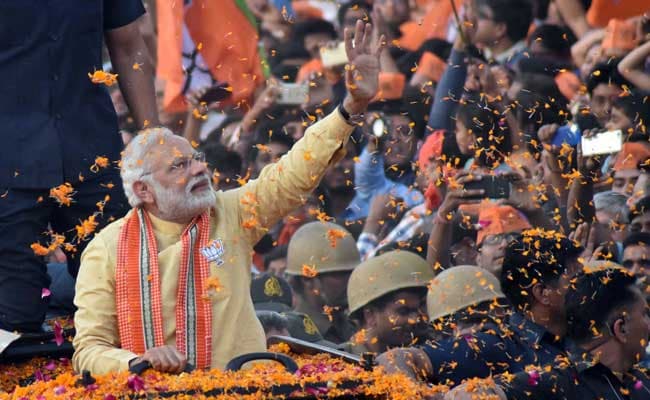
PM Narendra Modi campaigned extensively for the Uttar Pradesh assembly elections 2017.
Quick Take
Summary is AI generated, newsroom reviewed.
PM delivers Uttar Pradesh for his party with massive result
Best performance by a party since 1977
PM and other BJP leaders meet today to pick Chief Minister
"Our election campaign has hit a roadblock," PM Modi told campaign managers and two ministers in Delhi last month, a week before the sixth of seven phases of voting was to begin in Uttar Pradesh, according to news agency Reuters.
"I don't want to feel that I could have pushed myself a little more," PM Modi was quoted as saying by a close aide who attended the meeting, said Reuters.
For three full days, the PM camped out in the holy city of Varanasi, his parliamentary constituency, walking the ancient streets and stopping at temples to seek blessings, despite warnings from aides about his security and the risk to his reputation if the BJP lost the state.
Yesterday, the PM proved how misplaced those fears were, with the BJP winning the biggest majority in Uttar Pradesh for any party since 1977.
The triumph endorses the personal popularity of the 66-year-old PM as also his decision to turn the campaign into a referendum on his own performance after his shock decision last November to abolish high-denomination banknotes, a move he framed as a fight for the poor against the corrupt rich.
"We were always nervous that overexposing the PM in the final stages of the election could make us look desperate," said Keshav Prasad Maurya, the BJP's state leader in Uttar Pradesh.
The BJP won 312 of the 403 seats in the state assembly and, with 39.7 per cent of the vote, almost matched its showing in Uttar Pradesh in the 2014 general election, when it claimed the biggest parliamentary majority in three decades.
"Modi's magic has destroyed the opposition and silenced sceptics in the party," Mr Maurya told Reuters as the scale of the victory became clear.
The win clears a path a second term for PM Modi, and the BJP will now easily consolidate its grip over UP, which chooses the highest number of MPs (80 of 545 in the Lok Sabha).
The outsized victory has raised hopes among investors that the BJP will embark on a round of new reforms to boost growth in Asia's third-largest economy, and try to tackle the corruption and red tape that has long undermined India's potential.
Economists now expect PM Modi to launch initiatives aimed at flushing out ill-gotten gains from real estate, gold and campaign finance.
But they caution that his biggest task remains transforming India's economy into one that creates enough jobs for an emerging generation that is desperate to give up life on the farm for a more prosperous future.
"Jobs is the biggest risk," said Rajiv Kumar, an economist at the Delhi-based Centre for Policy Research. "That's where he has to focus very hard and it could mean reforms as radical as demonetisation."
The BJP now heads the government in states where more than half of Indians live, while the Congress, which has governed the country for most of the 70 years since independence, leads in regions covering less than 8 per cent of the population.
PM Modi relied on his own charisma to clinch crucial votes in poor and agrarian Uttar Pradesh, but his campaign manager Amit Shah proved unbeatable in his strategy, fielding the right candidates in a region where many people vote along caste and religious lines.
Critics accuse the BJP of switching to a more communally divisive tone to fire up their Hindu base as voting, staggered over the course of a month, progressed.
Mr Shah derided political opponents as "K.A.S.A.B", acronym-izing the name of one of the 10 Pakistani terrorists who attacked Mumbai in 2008. Opponents said he was unsubtly referencing terrorists as Muslims in a state where the minority community forms 18 per cent of the population. It is true that the BJP's huge win is partly on account of a massive consolidation of the Hindu vote, which virtually all of its scattered castes picking the party.
On the campaign trail, the PM was also accused of trying to polarize voters by asking why the state government ensured there were no power cuts in the Muslim holy month of Ramadan but not during the festival of Diwali.
The BJP has said its mammoth result could not have been achieved if the population believes it practices divisive policies.
Track Latest News Live on NDTV.com and get news updates from India and around the world

